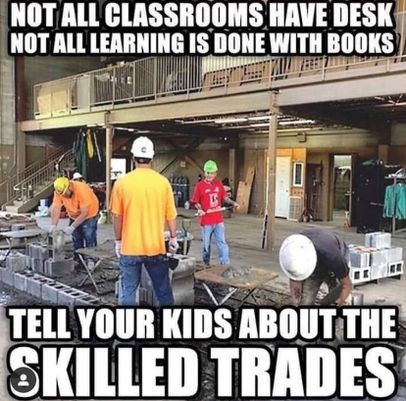
- Subscribe to RSS Feed
- Mark as New
- Mark as Read
- Bookmark
- Subscribe
- Printer Friendly Page
- Report Content
There's a Skilled Trade Labor Shortage. Can We Fix It?
Back in Joe Plumbers day, plumbing was considered a good, honest living. Before shop classes started disappearing from high schools and four-year college was championed as the only respectable career path, Plumbers could put a classified ad in Sunday's paper and have six or eight résumés on his desk by Monday. Good résumés, too. But those days have gone the way of daily newspapers.
"Very, very rarely will you get a licensed, skilled plumber calling you," says Plumbers. He's 55 now and spent his career rising up in the plumbing business. He started straight out of high school and soon founded Plumbers Plumbing. In 1992, he bought into a plumbing franchise called Mr. Rooter to "learn the business side of things". Today he owns Mr. Rooter territory throughout Ohio, covering 3.8 million people, with 65 employees and 30 trucks. He's watched the skilled labor shortage coming for a long time, but it's only the past few years that have started to really hurt.
"When the computer age hit, maybe 20, 25 years ago, all of a sudden it wasn't sexy to be a tradesperson," says Plumbers. "But back then, there were people my age still in it. Now we're seeing those people aging out, and there's nobody to backfill them. That's why we're having such a crunch now."
Then there's the lingering misperception that skilled trades and higher education are two different things -- something people like Plumbers want to change. It takes four to six years to earn a plumbing license, unlike a college degree. And in some ways, a trade education is a better deal. Workers can be paid on the job while they learn and then "graduate" into the workforce with higher starting salaries and without the burden of student debt.
To save his profession, Plumbers has begun thinking differently. Finding a licensed plumber has become a needle-in-a-haystack problem. "So, we opened it up to the entire haystack," he says. He now hosts biweekly career nights to try to educate the local workforce on just how good plumbing can be and has implemented a 12-month paid training program so he can give new hires of any background $18 to $25 an hour to start. Once in a truck, he tells them, his plumbers make $60,000 to $80,000 yearly. With time and experience, some even make $200,000.
Although the story above is fictional what efforts are you putting in to think outside the box so that things will work? It's a bigger question than one plumber in Ohio can answer. Success will require changing more than just careers -- it will require changing society at large. Indeed, it isn't easy to become a licensed tradesperson, which is also part of the problem. The process takes time and commitment and must meet the rigorous legal criteria required of technicians who work with complex, potentially dangerous systems. With fewer attempting the feat in the first place, and baby boomers retiring in record numbers, contractors are left with a unique hiring gap that can't be filled overnight -- and they're losing business because of it. A recent National Association of Home Builders survey showed 81 percent of members experienced delays in completing projects due to the shortage.
So, what do you do that may be outside the box? I am going to suggest one way that sometimes people look at and say will not work. Look outside and hire experts to recruit for you. You may be a master electrician or a journeyman plumber, but do you have a HR/Recruiting degree and know how to recruit outside your company? There are organizations out here like The Blue Collar Recruiter & Virtual Trade School that will not only help find and hire trades people but will also help in their training. Just think of the revenue you can generate by just putting one more additional truck on the road.
One other suggestion get involved in your local school and hold a celebration day for high school graduates going into the trades, similar to what some schools do for athletes on National Signing Day.
The short answer is yes, we can overcome the shortage out here but you need to be proactive.
You must be a registered user to add a comment. If you've already registered, sign in. Otherwise, register and sign in.



